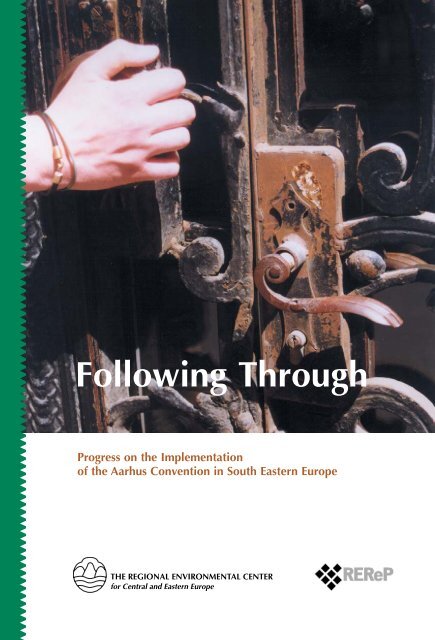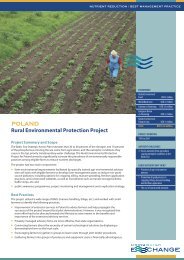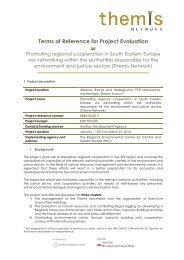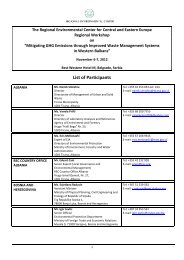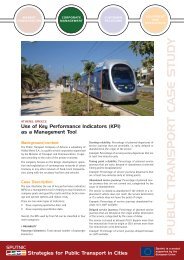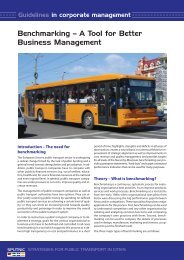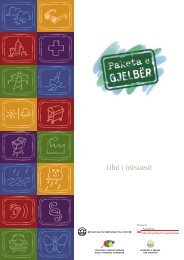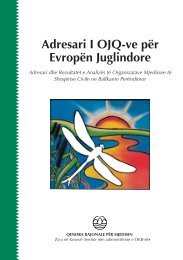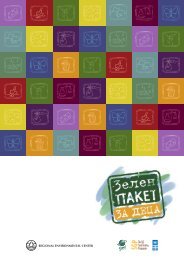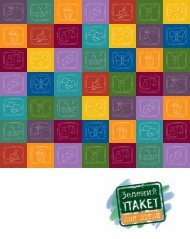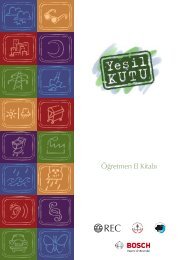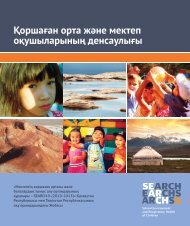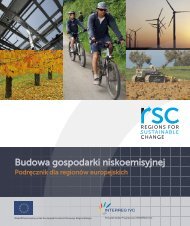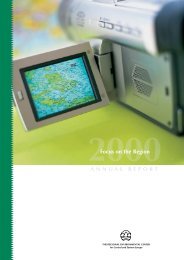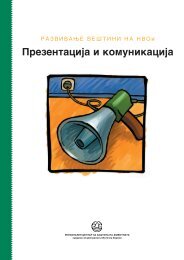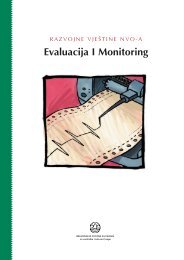Following Through - The Regional Environmental Center for Central ...
Following Through - The Regional Environmental Center for Central ...
Following Through - The Regional Environmental Center for Central ...
You also want an ePaper? Increase the reach of your titles
YUMPU automatically turns print PDFs into web optimized ePapers that Google loves.
<strong>Following</strong> <strong>Through</strong><br />
Progress on the Implementation<br />
of the Aarhus Convention in South Eastern Europe<br />
THE REGIONAL ENVIRONMENTAL CENTER<br />
<strong>for</strong> <strong>Central</strong> and Eastern Europe
Effective implementation of the Aarhus Convention<br />
may have many preconditions. One such<br />
precondition, which at the same time serves<br />
as a useful mechanism, could be the development<br />
of implementation strategies and action plans.<br />
<strong>The</strong>se strategies need to be based on a thorough assessment of needs in regard to legislative and<br />
institutional frameworks, practices, capacity-building, training, in<strong>for</strong>mation dissemination and<br />
public awareness-raising, as well as on identification of priorities to facilitate a more efficient and<br />
successful implementation of the Aarhus Convention. Implementation of the project Support<br />
Developing Strategies <strong>for</strong> Implementation of the Aarhus Convention in South Eastern Europe<br />
within the <strong>Regional</strong> <strong>Environmental</strong> Reconstruction Programme <strong>for</strong> South Eastern Europe<br />
(REReP), <strong>for</strong> which the Netherlands Ministry <strong>for</strong> Foreign Affairs provides support, was begun in<br />
April 2001 by the <strong>Regional</strong> <strong>Environmental</strong> <strong>Center</strong> <strong>for</strong> <strong>Central</strong> and Eastern Europe (REC) in cooperation<br />
with the ministries of environment and non-governmental organisations (NGOs) from<br />
Albania, Bosnia and Herzegovina, Bulgaria, Kosovo (territory under interim UN administration),<br />
FYR Macedonia, Romania, and Serbia and Montenegro. It will run through December 2003.<br />
Croatia, the lead country on this topic, as well as representatives of the Aarhus Convention<br />
Secretariat, also participated in the Steering Committee meetings.<br />
Goals<br />
• Ensure effective implementation of<br />
the Aarhus Convention in South<br />
Eastern Europe region through a<br />
transparent and participatory process<br />
of developing implementation strategies<br />
<strong>for</strong> the Aarhus Convention;<br />
• Provide assistance to SEE government<br />
officials in order to develop an<br />
implementation strategy through a<br />
regional framework and the combination<br />
of national and local activities;<br />
• Develop a structure <strong>for</strong> the ongoing<br />
involvement of civil society, and <strong>for</strong><br />
direct NGO involvement in official<br />
working groups;<br />
• Support capacity building of governmental<br />
officials and NGOs to enable<br />
them to facilitate the implementation<br />
of the Aarhus Convention.<br />
PROGRESS TO DATE<br />
Work on developing implementation strategies has<br />
followed the above-mentioned patterns in each<br />
country. Needs assessment reports have been prepared<br />
with recommendations <strong>for</strong> priority activities,<br />
which were discussed with experts and NGOs, as<br />
well as by inter-ministerial working groups established<br />
to discuss the project results. Based on the<br />
finalised needs assessments draft work plans have<br />
been drawn up <strong>for</strong> governmental and NGO activities,<br />
which include recommended steps <strong>for</strong> the<br />
development of an implementation strategy and<br />
action plan in each country, and <strong>for</strong> concrete capacity-building,<br />
training, in<strong>for</strong>mation dissemination<br />
and public awareness raising activities. <strong>The</strong> project’s<br />
activities, as well as the development of strategy, are<br />
conducted in an open, transparent and participatory<br />
way. <strong>The</strong>re has been substantial NGO involvement<br />
in discussing and finalising the needs assessment<br />
reports and the country work plans. <strong>The</strong><br />
NGOs and the broader public are in<strong>for</strong>med about<br />
the project’s activities and results through websites,<br />
bulletins, articles, meetings and networking. Broad
Implementing the Aarhus Convention in practice: NGO pilot projects in five SEE countries<br />
• Supporting the Development of Opinion Leaders in a Rural Community by<br />
Implementing the Aarhus Convention’s Principles, implemented by ECO-ALPEX 024,<br />
Romania: <strong>The</strong> project requires in<strong>for</strong>mation regarding the landfill site near the Chiscani<br />
community, and will actively involve the citizens in the local decision-making process<br />
to eliminate the landfill.<br />
• Creating Sustainable Solutions <strong>for</strong> Elimination of Illegal Landfills through Implementation<br />
of the Aarhus Convention, implemented by the <strong>Environmental</strong> Association Izgrev,<br />
FYR Macedonia: <strong>The</strong> pilot project will contribute to the development of policies to create<br />
sustainable solutions <strong>for</strong> the elimination of illegal landfills through public participation in<br />
the local decision-making process.<br />
• Free Access to Nuclear In<strong>for</strong>mation — Implementing the Aarhus Convention in Romania,<br />
implemented by the Romanian Association of Nature Lovers (ARIN), Romania: <strong>The</strong> objective<br />
of the project is to improve the capacity of the citizens to participate in decision-making<br />
in regard to nuclear activities in Romania, by enabling them to access in<strong>for</strong>mation and<br />
by creating a framework <strong>for</strong> discussion between different stakeholders.<br />
• Capacity-Building <strong>for</strong> the Aarhus Convention at Local Level in Romania, implemented by<br />
Friends of the Earth, Galati, Romania: <strong>The</strong> objective of the project is to develop capacity at<br />
the local level <strong>for</strong> the implementation of the Aarhus Convention <strong>for</strong> local governments and<br />
NGOs, and to test these capacities in the local level decision-making process regarding<br />
the solution of potential environmental pollution problems.<br />
• Reduce, Reuse, Recycle — Framework <strong>for</strong> Local Strategy, implemented by the<br />
<strong>Environmental</strong> Protection Agency, Serbia and Montenegro: <strong>The</strong> objective of the project is<br />
to ensure wider public involvement in the design and adoption of a framework <strong>for</strong> municipal<br />
waste management strategy.<br />
• Campaign Helping People to Participate, implemented by the Greener Bourgas<br />
Foundation, Bulgaria: <strong>The</strong> objective of the project is to build capacity at the local level<br />
and to establish a mechanism and practice <strong>for</strong> public participation through the development<br />
of a public participation strategy in the development of the municipal air quality<br />
management programme of the city of Burgas.<br />
• Detailed Urban Plan and Strategic <strong>Environmental</strong> Assessment (SEA) <strong>for</strong> the Beach Area of<br />
Varna, Bulgaria. Alternative Ways to Involve the Public in the Development of the Plan<br />
and in Its Subsequent Implementation, implemented by the Foundation Institute <strong>for</strong><br />
Ecological Modernisation, Bulgaria: <strong>The</strong> objective of the project is to include all<br />
stakeholders in the decision-making process <strong>for</strong> the development of a detailed urban plan,<br />
its SEA and infrastructure planning.<br />
• Community Participation in Waste Management, implemented by Co-Plan, Centre <strong>for</strong><br />
Habitat Development, Albania: <strong>The</strong> project will engage the communities of the municipality<br />
of Kamza in active planning and decision-making with respect to waste management.
NGOs have been involved in the development of implementation strategy in many ways:<br />
• NGO representatives have been invited to be the members of the inter-ministerial working<br />
groups, to have direct access to discussions on interim project results and planned<br />
activities, and to represent the NGO community’s views. In all of the countries more than<br />
one NGO has participated in these discussions.<br />
• A network of specific NGO focal points have been selected and funded within the project<br />
to ensure direct NGO involvement in the project activities, to in<strong>for</strong>m the NGOs and<br />
request feedback from them on project related activities and interim results, and to participate<br />
in the work of the inter-ministerial working groups and regional Steering Committee<br />
meetings. <strong>The</strong> NGO focal points have developed their own work plan, established a network<br />
of communication with interested NGOs in their respective countries and held regular<br />
meetings and consultations with them on project related or Aarhus Convention related<br />
activities. In some countries (Romania, Serbia and Montenegro) the task is shared<br />
between two NGOs.<br />
input has been solicited through public discussions and commenting procedure be<strong>for</strong>e the finalisation<br />
of the strategy. <strong>The</strong> finalised strategies and action plans will be submitted to the respective<br />
ministries <strong>for</strong> further steps towards official adoption by the end of September 2003.<br />
A COMBINATION OF REGIONAL, NATIONAL AND LOCAL ACTIVITIES<br />
Activities at a national and local level have been defined in partnership with the ministry officials<br />
responsible <strong>for</strong>, and NGOs interested in, the implementation of the Aarhus Convention. Such<br />
activities include the work of the country teams on the implementation strategy, the local pilot<br />
projects, capacity-building workshops and training on the implementation of the Aarhus<br />
Convention <strong>for</strong> officials, mixed stakeholders and NGOs. <strong>The</strong> Aarhus and NGO focal points<br />
selected <strong>for</strong> the project activities, independent experts and REC experts have been part of the<br />
core project implementation team.<br />
A regional Steering Committee has been set up to oversee and monitor the project’s activities and<br />
to facilitate an exchange of experience and expertise. It normally meets on a bi-annual basis, and<br />
a final regional workshop will be organised in September 2003 to disseminate the results of the<br />
project and to discuss future needs and proposals <strong>for</strong> activities.<br />
NGO PILOT PROJECTS<br />
Local pilot project grants were awarded in five countries. A total of 81 concept papers were submitted,<br />
and eight grants were selected <strong>for</strong> funding. <strong>The</strong> pilot projects will promote the effective<br />
application of the Aarhus Convention in practice, ensure efficient public involvement in the decision-making<br />
process in accordance with the Convention, develop participatory practices in the<br />
community level decision-making process, stimulate dialogue and cooperation among local<br />
authorities, NGOs, the public and other stakeholders, and improve the in<strong>for</strong>mation flow among<br />
interested parties.
Implementing the Aarhus Convention in practice: NGO pilot projects in five SEE countries<br />
• Supporting the Development of Opinion Leaders in a Rural Community by<br />
Implementing the Aarhus Convention’s Principles, implemented by ECO-ALPEX 024,<br />
Romania: <strong>The</strong> project requires in<strong>for</strong>mation regarding the landfill site near the Chiscani<br />
community, and will actively involve the citizens in the local decision-making process<br />
to eliminate the landfill.<br />
• Creating Sustainable Solutions <strong>for</strong> Elimination of Illegal Landfills through Implementation<br />
of the Aarhus Convention, implemented by the <strong>Environmental</strong> Association Izgrev,<br />
FYR Macedonia: <strong>The</strong> pilot project will contribute to the development of policies to create<br />
sustainable solutions <strong>for</strong> the elimination of illegal landfills through public participation in<br />
the local decision-making process.<br />
• Free Access to Nuclear In<strong>for</strong>mation — Implementing the Aarhus Convention in Romania,<br />
implemented by the Romanian Association of Nature Lovers (ARIN), Romania: <strong>The</strong> objective<br />
of the project is to improve the capacity of the citizens to participate in decision-making<br />
in regard to nuclear activities in Romania, by enabling them to access in<strong>for</strong>mation and<br />
by creating a framework <strong>for</strong> discussion between different stakeholders.<br />
• Capacity-Building <strong>for</strong> the Aarhus Convention at Local Level in Romania, implemented by<br />
Friends of the Earth, Galati, Romania: <strong>The</strong> objective of the project is to develop capacity at<br />
the local level <strong>for</strong> the implementation of the Aarhus Convention <strong>for</strong> local governments and<br />
NGOs, and to test these capacities in the local level decision-making process regarding<br />
the solution of potential environmental pollution problems.<br />
• Reduce, Reuse, Recycle — Framework <strong>for</strong> Local Strategy, implemented by the<br />
<strong>Environmental</strong> Protection Agency, Serbia and Montenegro: <strong>The</strong> objective of the project is<br />
to ensure wider public involvement in the design and adoption of a framework <strong>for</strong> municipal<br />
waste management strategy.<br />
• Campaign Helping People to Participate, implemented by the Greener Bourgas<br />
Foundation, Bulgaria: <strong>The</strong> objective of the project is to build capacity at the local level<br />
and to establish a mechanism and practice <strong>for</strong> public participation through the development<br />
of a public participation strategy in the development of the municipal air quality<br />
management programme of the city of Burgas.<br />
• Detailed Urban Plan and Strategic <strong>Environmental</strong> Assessment (SEA) <strong>for</strong> the Beach Area of<br />
Varna, Bulgaria. Alternative Ways to Involve the Public in the Development of the Plan<br />
and in Its Subsequent Implementation, implemented by the Foundation Institute <strong>for</strong><br />
Ecological Modernisation, Bulgaria: <strong>The</strong> objective of the project is to include all<br />
stakeholders in the decision-making process <strong>for</strong> the development of a detailed urban plan,<br />
its SEA and infrastructure planning.<br />
• Community Participation in Waste Management, implemented by Co-Plan, Centre <strong>for</strong><br />
Habitat Development, Albania: <strong>The</strong> project will engage the communities of the municipality<br />
of Kamza in active planning and decision-making with respect to waste management.
<strong>The</strong> projects will focus on direct implementation of national legislation and on one or more provisions<br />
of the Aarhus Convention, primarily Articles 6, 7 and 8. Additionally, they will provide an<br />
opportunity <strong>for</strong> development or further development of effective public involvement mechanisms,<br />
developing good practices and democratic approaches in communities, and on helping to<br />
define activities regarding the concrete and specific process of decision-making.<br />
CAPACITY-BUILDING AND TRAINING<br />
An analysis of capacity-building and training needs has been carried out in order to develop<br />
recommendations <strong>for</strong> a specific capacity-building and training programme both <strong>for</strong> government<br />
officials and the NGOs within the Aarhus Convention implementation strategy being<br />
prepared in each SEE country. A specific training component was carried out in Kosovo. <strong>The</strong><br />
implementation of capacity-building and training activities started in October 2002, and<br />
include local language workshops and seminars, as well as training provided by local trainers<br />
in regard to general and specific aspects of the Aarhus Convention targeting officials and<br />
NGOs at central, regional and local levels.<br />
EXPECTED IMPACT<br />
Great interest has been shown in the implementation of Aarhus Convention in many of the SEE<br />
countries thanks to its progressive and unique contents. <strong>The</strong> ongoing democratisation and<br />
administrative re<strong>for</strong>m processes in these countries are in line with the need to implement the<br />
Convention. <strong>The</strong> project represents a coordinated ef<strong>for</strong>t to promote the implementation of the<br />
Aarhus Convention and has there<strong>for</strong>e received substantial support from the country partners as<br />
well as from the Aarhus Convention Secretariat. Aarhus focal points in the respective ministries<br />
and NGO partners have donated their time to advise and participate in the project’s activities,<br />
and to contribute to the output of the project. This has created a cooperative spirit and has positively<br />
influenced the project’s events and activities.<br />
<strong>The</strong> approximate number of persons<br />
trained in capacity-building workshops<br />
will exceed 1,000 and will<br />
target governmental officials and<br />
NGOs at central, regional and local<br />
levels, as well as parliamentarians,<br />
journalists and businessmen. <strong>The</strong><br />
project participants will also be<br />
af<strong>for</strong>ded opportunities to learn from<br />
the experiences of other European<br />
countries. <strong>The</strong> Aarhus and NGO focal<br />
points had the opportunity to attend<br />
the Aarhus Convention Meeting of<br />
Parties, task <strong>for</strong>ces and working group<br />
meetings within this project, and<br />
through this gained diverse international<br />
experience on matters<br />
they will be able to apply.<br />
<strong>The</strong> project is expected to accelerate the process<br />
of ratification and early implementation of the<br />
Aarhus Convention. <strong>The</strong> participating country<br />
partners rely heavily on this project to implement<br />
the Convention, while those that are not yet parties<br />
to the Convention utilise the project to develop<br />
the documents needed <strong>for</strong> its ratification.<br />
<strong>The</strong> project delivers a mechanism <strong>for</strong> the implementation<br />
of the Aarhus Convention to the beneficiaries,<br />
and through the implementation strategy<br />
it provides a concrete action plan <strong>for</strong> specific<br />
steps and measures within a short time frame. If<br />
governments follow these recommendations, legislative<br />
and institutional frameworks will significantly<br />
be improved, which will enable the public<br />
to participate more efficiently in decision-making.<br />
<strong>The</strong> trainings will lead to increased governmental<br />
and NGO capacity. In<strong>for</strong>mation dissemination<br />
and public awareness-raising activities will enable
Aarhus and<br />
Ministry Focal Points<br />
ALBANIA<br />
Elvana Myrtaj<br />
Ministry of Environment<br />
Rr. E Durresit No. 27<br />
Tirana<br />
Tel: (35-5) 422-4996<br />
Fax: (35-5) 427-0623<br />
BULGARIA<br />
Nelly Ilieva<br />
Ministry of Environment and Water<br />
67 Gladstone str<br />
1000 Sofia<br />
Tel: (359-2) 940-6299<br />
E-mail: ilievanelly@moew.<br />
government.bg<br />
BOSNIA AND HERZEGOVINA<br />
Mladen Rudez<br />
Federal Ministry <strong>for</strong><br />
Planning and Environment<br />
9a, Titova<br />
BIZ- 71000 Sarajevo<br />
Tel : (387- 33) 445-146<br />
Fax: (387-33) 445-031<br />
E-mail: m.rudez@bih.net.ba<br />
MACEDONIA<br />
Biljana Siderovska<br />
Saso Sekulovski<br />
Ministry of Environment and Physical<br />
Planning Public Relations Office<br />
Sv. Kliment Ohridski bb<br />
(NIP Nova Makedonija)<br />
1000 Skopje<br />
Tel: (389-2) 229-717<br />
Fax: (389-2) 229-808<br />
E-mail: pro@moe.gov.mk<br />
ROMANIA<br />
Lucia Ceuca<br />
Ministry of Waters and<br />
<strong>Environmental</strong> Protection<br />
Blvd. Libertatti, No. 12, sector 5<br />
70005 Bucharest<br />
Tel: (40-21) 335-7107<br />
Fax: (40-21) 410-0482<br />
E-Mail: lceuca@mappm.ro<br />
SERBIA AND MONTENEGRO<br />
Dragoljub Todic<br />
Federal Secretariat <strong>for</strong> Health<br />
Social Policy and Environment<br />
Bulevar Lenjina 2<br />
11070 Belgrad<br />
Tel: (381-64) 202-7028<br />
E-mail: todic@hera.smrnzs.sv.gov.yu<br />
Viktor Subotic<br />
Ministry <strong>for</strong> Urban Planning<br />
and Environment<br />
ul. Marksa i Engelsa<br />
Poslovni Centar Vektra<br />
81000 Podgorica<br />
Tel: (381-81) 482-121<br />
Fax: (381-81) 234-131<br />
Mobile: (381-69) 675-012<br />
NGO Focal Points<br />
ALBANIA<br />
Dhimiter Haxhimihali<br />
Assotiation of Industrial Ecology<br />
Rr. Maliq Muco, P. 46, SH.1<br />
Ap. 4. Tirana<br />
Tel: (355-4) 238-853<br />
Fax: (355-4) 238-853<br />
E-mail: hamihali@yahoo.com<br />
BULGARIA<br />
Alexander Kodjabashev<br />
Ecological Association Demetra<br />
Boulevard Skobelev 16. entrance 2<br />
1463 Sofia<br />
Tel: (359-2) 526-956<br />
Fax: (359-2) 951-5885<br />
E-mail: kodjabashev@mbox.cit.bg<br />
demetra@iterra.net<br />
BOSNIA AND HERZEGOVINA<br />
Ozren Runic<br />
<strong>The</strong> Young Researchers of Banja Luka<br />
Mladena Stojanovica 2<br />
78000 Banja Luka<br />
Tel: (387-51) 320-960<br />
E-mail: oggie@europe.com<br />
FYR MACEDONIA<br />
Fanny Mihailovska<br />
Aneta Musmanovska<br />
Journalist-Legal <strong>Environmental</strong><br />
<strong>Center</strong> Erina<br />
Str. Lermontova 3/3<br />
1000 Skopje<br />
Tel: (389-2) 238-404<br />
Fax: (389-2) 238-404<br />
E-mail: centarerina@hotmail.com<br />
ROMANIA<br />
Florin Mircea Vasiliu<br />
Ecosens<br />
str Dr Felix nr. 85 cod 781543<br />
Bucharest<br />
Tel/Fax: (402-1) 313-8560<br />
E-mail: ecosens@fx.ro<br />
Camelia Zamfir<br />
Friends of the Earth<br />
Str. Portului, bloc Siret4, sc.7, ap 109<br />
6200 Galati<br />
Tel: (402-36) 462-564<br />
E-mail: earthfriends@rdslink.ro<br />
SERBIA AND MONTENEGRO<br />
Snezana Mitrovic<br />
<strong>Center</strong> <strong>for</strong> Ecology, Subotica<br />
Trg. Cara Jovana Nenada 15,<br />
24000 Subotica<br />
Tel: (381-64) 202-7028<br />
Fax: (381-024) 553-116<br />
E-mail: nenad@openunsubotica.co.y<br />
Marco Karaman<br />
Animal World Preservation Society –<br />
LYNX<br />
Trg Nicole Kovacevica 7<br />
P.O. Box 374, 81000 Pogorica<br />
Tel: (38-81) 6907-8661<br />
E-mail: lynx@cg.yu<br />
Magda Toth Nagy, Programme Head • Public Participation Programme<br />
<strong>The</strong> <strong>Regional</strong> <strong>Environmental</strong> <strong>Center</strong> <strong>for</strong> <strong>Central</strong> and Eastern Europe<br />
Ady Endre ut 9-11 • 2000 Szentendre • Hungary<br />
Tel: (36-26) 504-035 • Fax: (36-26) 311-294<br />
E-mail: tmagdi@rec.org • Website: www.rec.org<br />
Supported by the Ministry of Foreign Affairs of the Netherlands


